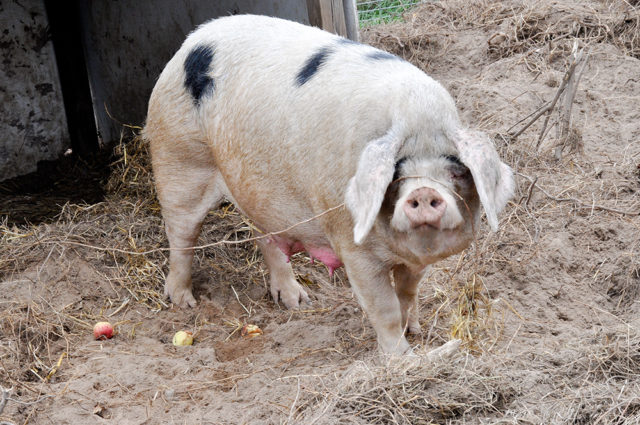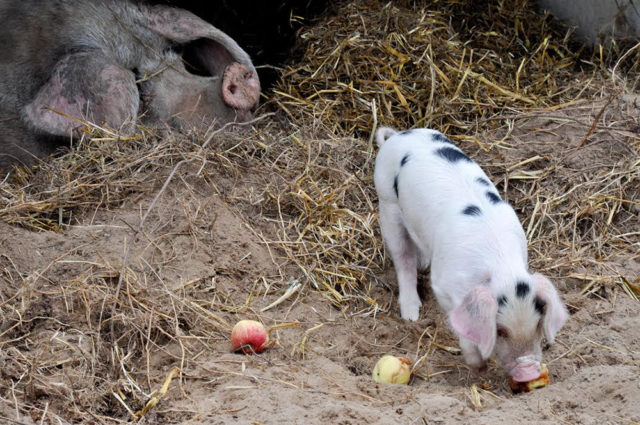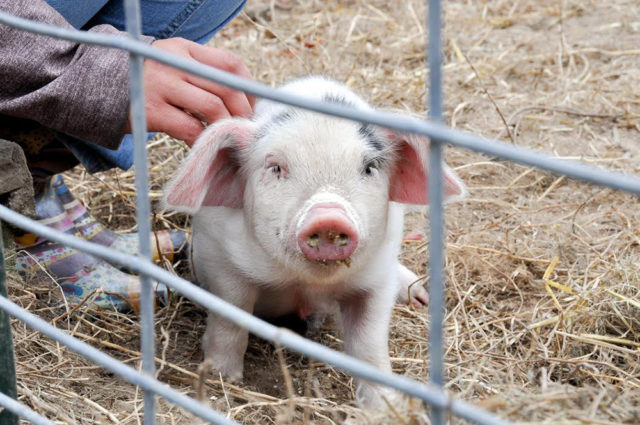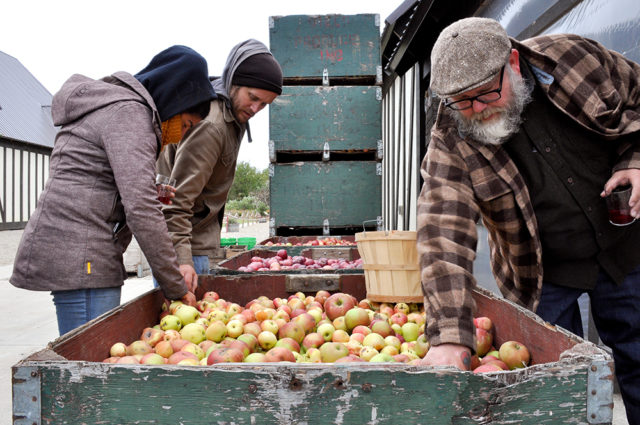Much like their distant cousin, “Babe,” the Gloucestershire Old Spot pigs that live on Virtue Cider’s fifty-acre orchard want to be useful. The breed was popularized in the early 1900s as a farm animal that would graze on agricultural byproducts like fallen apples, which is when they also earned the nickname “Orchard Pigs.” Within a few decades, farmers realized the pigs were not only useful, but also produced some tasty and lean bacon. By the mid 1900s, however, these foraging fiends nearly went extinct as the mass pork production industry replaced them with pigs more suited for captivity.
 Centuries ago, Gloucestershire Old Spot pigs could be found on many orchards, searching the ground for fallen apples and ridding the orchard of unwanted bugs. Photos by Sarah Freeman.
Centuries ago, Gloucestershire Old Spot pigs could be found on many orchards, searching the ground for fallen apples and ridding the orchard of unwanted bugs. Photos by Sarah Freeman.
Few Old Spots remain, still hunting for fallen apples on orchards throughout England and France. Even fewer — less than 200 according to Virtue’s culinary director Missy Corey – live in the United States. A dozen of the famously docile pigs are the most recent addition to the Michigan cidery, owned and operated by former Goose Island brewmaster Greg Hall. Here, Hall is reviving centuries-old cider-making techniques and styles, including the use of Gloucestershire Old Spot pigs to maintain the farm.
“Back in 2011, when we started on this whole cider path, I went over to England and France and visited cider makers,” Hall recalls. “I found there are a lot of differences from beer.” Location being the main one — while beer was largely produced near urban centers within range of a freshwater source, cider was merely a means for farmers to turn a profit from abundant apples (and for years in the UK, cider was used in part to pay farmhands). “I figured out pretty quickly that the best ciders were made directly on the farm, and they’re made with apples that the farmer grows himself or buys from his neighbors. They press the apples themselves, and all pretty much age in wood.”
 As the piglets step into their new roles at Virtue Cider, their mom keeps a close eye on her babies.
As the piglets step into their new roles at Virtue Cider, their mom keeps a close eye on her babies.
Hall follows a similar model at Virtue. The cider mill is located next to what will soon be a thriving orchard and farm maintained by garden manager Ryan Beck and his squad of Old Spots. Beck is using what can be called an “integrated pest management” system that allows the farm to remain organic. The pigs act as natural pesticides, instead of the ever-popular spray. Rows of root vegetables, such as turnips and carrots, are planted between rows of apple trees. The pigs are allowed to graze on these — digging up and eating the vegetables as well as many bugs still in their larvae stage. The bugs never mature and, therefore, never ravage the apples. The pigs also feast on apples that have fallen off the trees and are unusable for cider. Folklore states the black spots that cover the white pigs were once bruises from falling apples
“They have ten-acres of pasture that we’re rotating them on. They’ve only been here about two weeks, but they seem exceptionally happy. They absolutely love the apples and really love foraging,” Corey says about the weeks-old piglets and their 300-pound mother. A second mother and her litter of piglets will soon arrive from Faith Farm, an Illinois farm that specializes in pasture-raised and drug-free livestock. “Since we’re really trying to bring this breed back and understand the benefits of them, it was really important for us to find pure stock. It took us about a month to find the right pigs.”
 The old spot pigs on Virtue Cider’s orchard serve many purposes: they function as pesticides, groundskeepers and, of course, good company.
The old spot pigs on Virtue Cider’s orchard serve many purposes: they function as pesticides, groundskeepers and, of course, good company.
The pigs’ practicality extends beyond the pasture. They are part of the Slow Food USA’s Ark of Taste, a cause Hall has been committed to since his time at Goose. The Ark consists of more than more than 1,100 products from over 50 countries deemed beneficial to a country’s diverse biological, cultural and culinary heritage. These include the Arkansas Black apples, Dominique chicken and fifty percent of the produce grown at Virtue. By next year, Hall hopes to double his flock of chickens and sounder of pigs.
 The orchard pigs will make it possible for Virtue Cider to grow superior apples for their cider.
The orchard pigs will make it possible for Virtue Cider to grow superior apples for their cider.
Like the unspoken truth at the end of “Babe,” this story has a somber ending. Filipe, the runt of the litter that scampers around his brothers and sisters — Boxer, Fancy, Desmond and Molly — gleefully picking at apples before they head-butt him away, is bound for the slaughterhouse by the time they reach the age of fourteen months. He and the others will become part of Virtue’s burgeoning culinary program that will bring French farmhouse cuisine to the bottle shop and tasting room in the form of a deli case and prepared meals on the weekends. For now, though, the happy piglets can be seen pigging out on bushels of apples arriving for the fall press.





